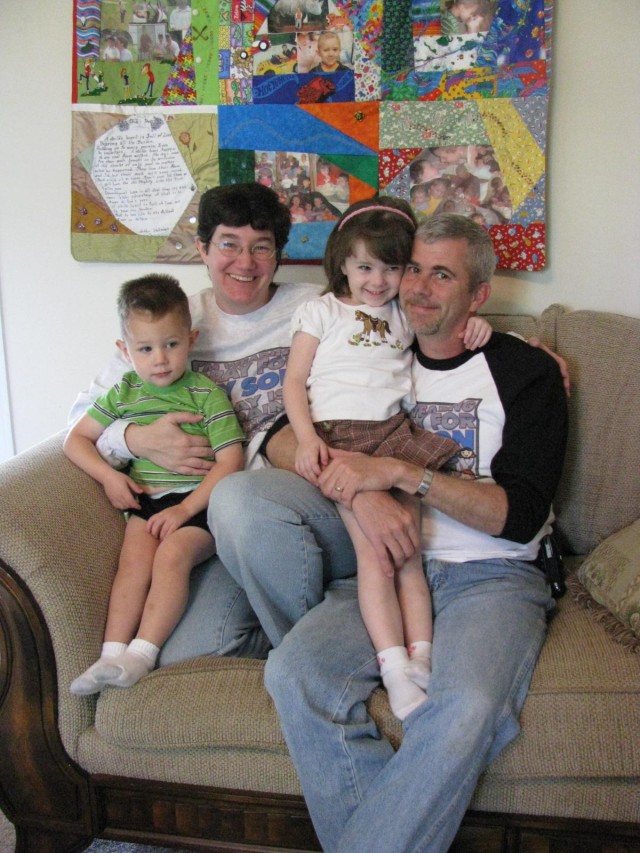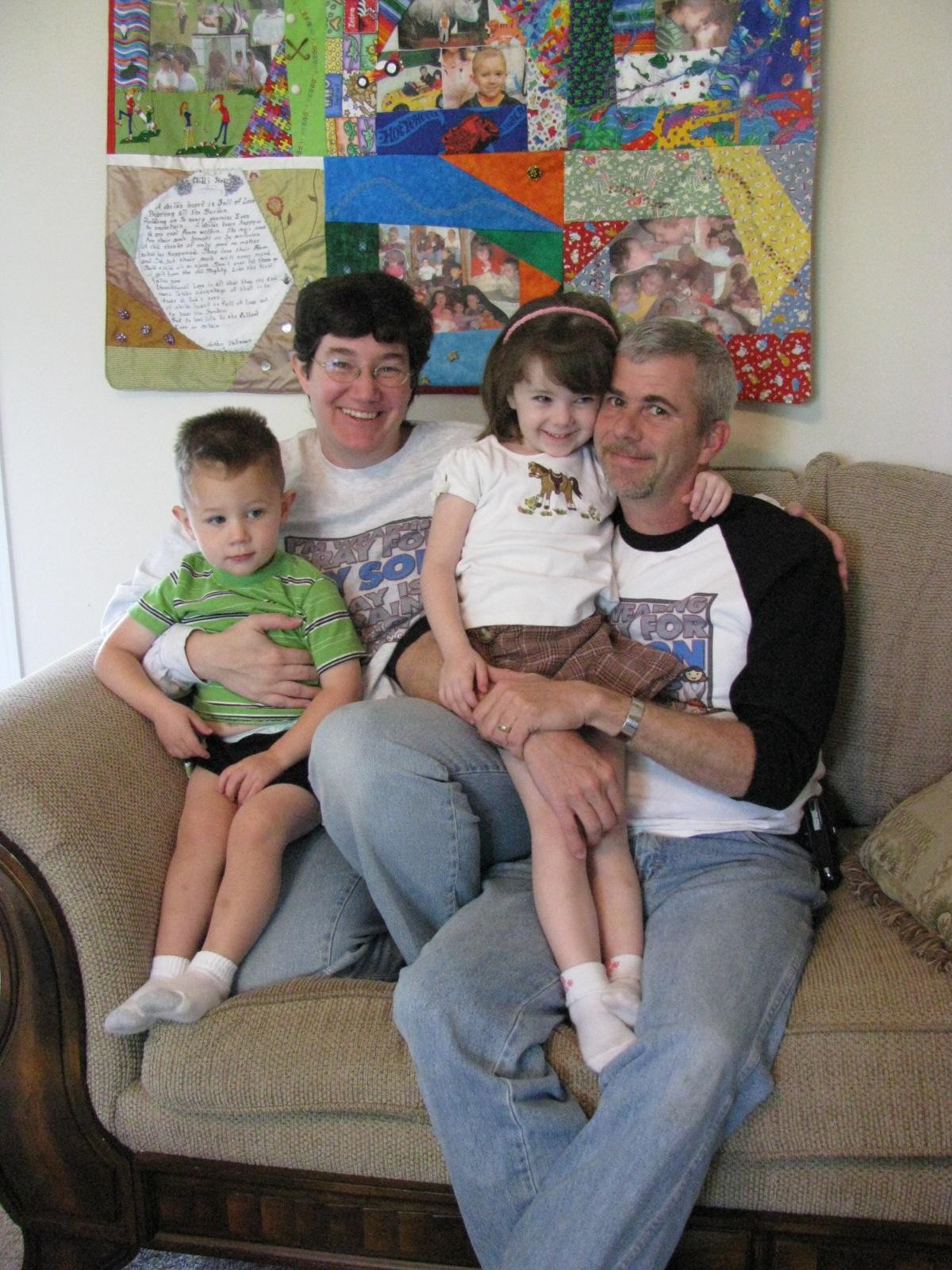
Two-year-old Matthew Lipski knows his big brother only through photographs and the memories of his parents.
Matthew was only 3 weeks old when his brother JJ died from a tumor on his brain stem, a condition known as Diffuse Intrinsic Pontine Giloma or brainstem gliomas. JJ's sister, Nikki, was only 2 when her brother died.
The siblings and their parents, Diana and Jim Lipski, are the family JJ left behind on Jan. 31, 2007, 16 months after being diagnosed with the inoperable brain tumor. Since then, the family has shared their story, hoping to increase awareness of this deadly pediatric cancer and to provide support for other families living though the pain, suffering and loss of a child to cancer.
"This cancer is so rare that you are pretty much all alone," Jim Lipski said. "And when we would go on the web for information we found it was limited and what we did find we didn't like reading. We want to encourage correspondence among parents whose children have pediatric cancer, especially brainstem cancer, so that they don't feel all alone."
The Lipski couple has established a foundation - I Could Be Your Child -- to increase awareness, to raise research funds for pediatric brain tumors, primarily DIPG, and to provide support for children and families diagnosed with a pediatric brain tumor.
The family will also participate in two American Cancer Society Relay for Life events - one this Friday and Saturday in Madison County at John Hunt Park and the other on May 8 in Limestone County at the Athens SportsPlex. The family will light a special candle in JJ's memory at the May 8 event.
JJ, whose full name is John Joseph, was born in 2000 in the National Naval Medical Center in Bethesda, Md., when both of his parents were serving in the Army and stationed in the D.C. area. Diana Lipski left the Army with seven years of service in 2001. Jim Lipski later left the Army after 16 years, six overseas assignments and multiple deployments, taking a job with Homeland Security that eventually brought them to Madison and closer to family.
"JJ was 4 at the time of our move," Diana Lipski said. "We were starting to see a few problems that would later turn out to be symptoms of his cancer. His speech was not where it should have been. But at the time we thought it was because he wasn't in a preschool program."
So, they enrolled JJ in preschool. But, following his preschool graduation, Jim Lipski noticed in a graduation picture that one of JJ's eyes was very much turned in. An eye doctor diagnosed lazy eye and prescribed glasses for JJ.
But still problems persisted.
"Jim's sister-in-law is an occupational therapist and she was brave enough to tell us that his speech should be further along," Diana Lipski said. "So, JJ had speech therapy over the summer and wore glasses. We took him to an ENT (ear, nose and throat specialist) who said his palate wasn't moving, and that can cause problems with speech."
In August 2005, after Hurricane Katrina, Jim Lipski spent a month along the Gulf Coast of Mississippi, where he worked in relief efforts and assisted his brother's family, who had lost their home in the hurricane.
"While he was gone, I started doing research," Diana Lipski said. "I was researching key words, trying to figure out what was going on with our son, and then JJ started losing his balance. That is a real big flag for a pediatrician."
Two days after Jim Lipski returned from hurricane relief efforts, JJ underwent a CAT scan at Huntsville Hospital that revealed a mass in his brain. He was rushed to Birmingham Children's Hospital, where JJ was examined and the Lipski couple was given the news no parent wants to hear.
"When you are told 'Sorry, your son has a brain tumor,' your eyes just glaze over and everything just fogs up," Diana Lipski said.
"But JJ was fine. The neurosurgeon was giving us this news and JJ was crawling on the furniture, having a good time and doing things 5-year-old boys do. The doctor was amazed and said JJ should have so much pain that he should be in the intensive care unit."
The Lipski couple believe JJ was born with the brain tumor and that he had a high tolerance for pain. They remembered only a few occasions over the previous summer when JJ complained of his head being hot, which could have been an indication of headaches caused by the tumor. But those headaches should have been excruciating, not mild as they were in JJ's case.
Under close examination, doctors discovered JJ could only lift his chin slightly. The Lipski couple thinks JJ had avoided lifting his chin from a very young age to avoid pain.
Although JJ seemed like a healthy boy on the outside, inside his body was losing control.
"The brain stem controls everything," Jim Lipski said. "It controls breathing, swallowing, speech and it sends out messages to the parts of the body.
"A tumor in the brain stem is inoperable. Doctors don't know what causes them. There is no cure. Children with this kind of tumor don't live longer than two years after diagnosis."
The couple also believe the "normalcy" of JJ's condition was affected by the power of prayer, the support network of friends from their church - St. John's Catholic Church in Madison - and in the will of God.
"As soon as we knew there could be a problem - on the way to Birmingham Children's Hospital for the first time - prayers started going out and friends were doing research for us," Diana Lipski said. "There's a group of ladies at church who I call our brain trust. They reached out to us with meals, helping my mom take care of Nikki and doing little things for us."
The family also received hundreds of cards and gifts from friends and people they didn't even know. JJ's schoolmates at Creekside Elementary School sent him cards and little surprises.
"I don't know if there was a day, certainly not a week, when something didn't show up in the mail or on our doorstep that helped us get through this," Diana Lipski said. "People would just send us stuff to try to make things better for us. There are a whole lot of strangers out there who truly care."
JJ's diagnosis of DIPG meant traveling to Birmingham Children's Hospital and eventually to the National Institutes for Health in Washington, D.C. JJ underwent brain surgery, radiation and chemotherapy. He was enrolled in clinical trials for both evaluation and treatment. The family got into the habit of thinking of a "medical trip" as a "mini-vacation" with an overnight stay at a hotel with a pool.
They took JJ to DisneyWorld, and managed to keep him in school through kindergarten and the beginning of first grade. JJ was able to play in his second season of T-ball.
But in November 2006, JJ's disease progression indicated there was not much more that could be done to keep him alive. Steroids kept some of the tumor swelling at bay and the family managed a second trip to DisneyWorld. On Jan. 31, 2007, JJ died.
"We kept life as normal as possible for JJ," Jim Lipski said. "He did all the little boy stuff. He played T-ball, he practiced his water skills and he went fishing. He did all the things that a little boy likes to do."
During his treatment, the Lipski couple met other couples with children suffering from DIPG. That helped them in their journey with the deadly disease. For that reason, they are working to connect families with children suffering from brainstem cancer. There are about 300 children in the U.S. currently diagnosed with DIPG, with about 40 of those families linked to the I Could Be Your Child website the Lipski's have established.
The Lipski couple also hope to increase awareness and raise funds through the website so more research is done on childhood cancers.
"The earliest diagnosis of cancer in children was in 1964," Jim Lipski said. "Not much has changed with treatment since then. The problem with pediatric cancers and childhood brain tumors is that very few families agree to putting their children through medical trials, and very few adults get brainstem cancer."
Cancer, as a whole, is underfunded, Jim Lipski said, but funding for children's cancer is at an extreme low. There are 120 different pediatric cancers and the U.S. government only provides $26 million annually for pediatric cancer research. In comparison, breast cancer research receives more than $400 million annually from the U.S. government.
"People reading this will think this is a sad story. They will think something like this won't happen to their child or their grandchild," Jim Lipski said. "But a child can wake up one day with a slight turn in their eye or suddenly have difficulty swallowing or have a morning variety headache, and all those symptoms can all lead to pediatric cancer.
"There is a distinct possibility, as slim as it might be, that the child of a friend, a church member, a family member or even your own could get this cancer."

Social Sharing